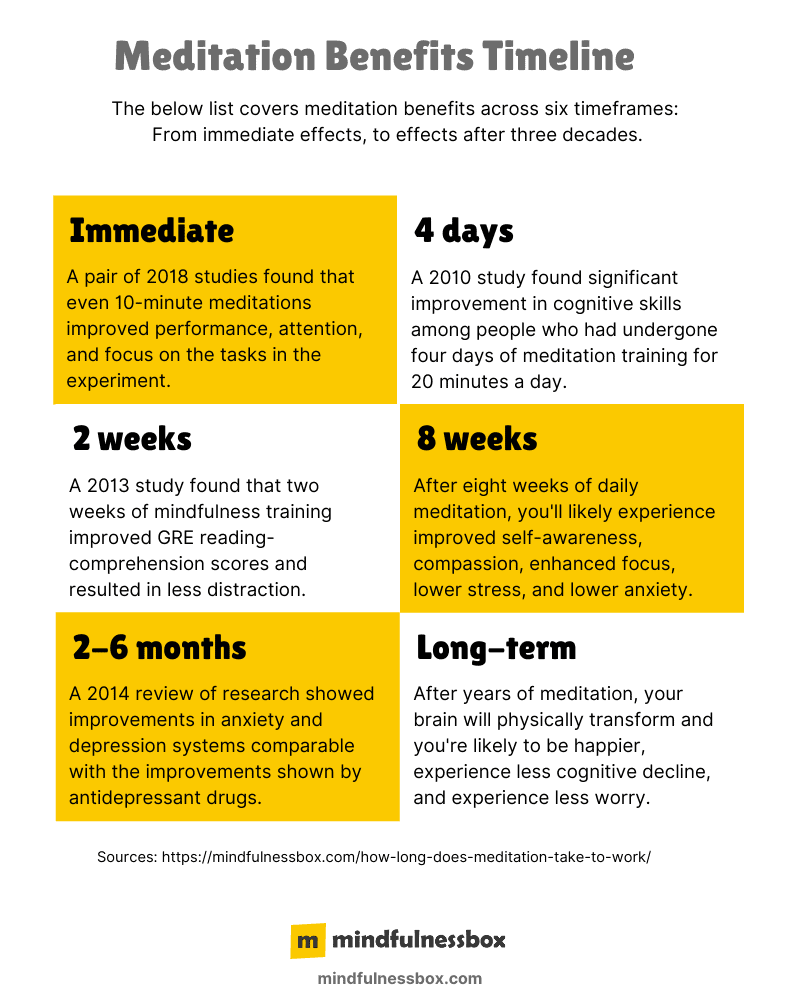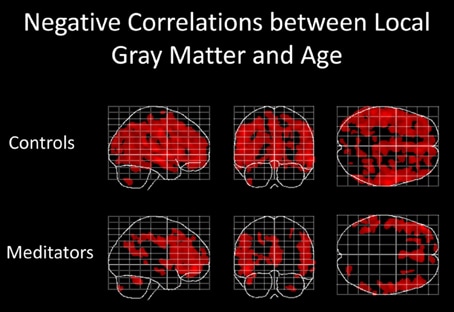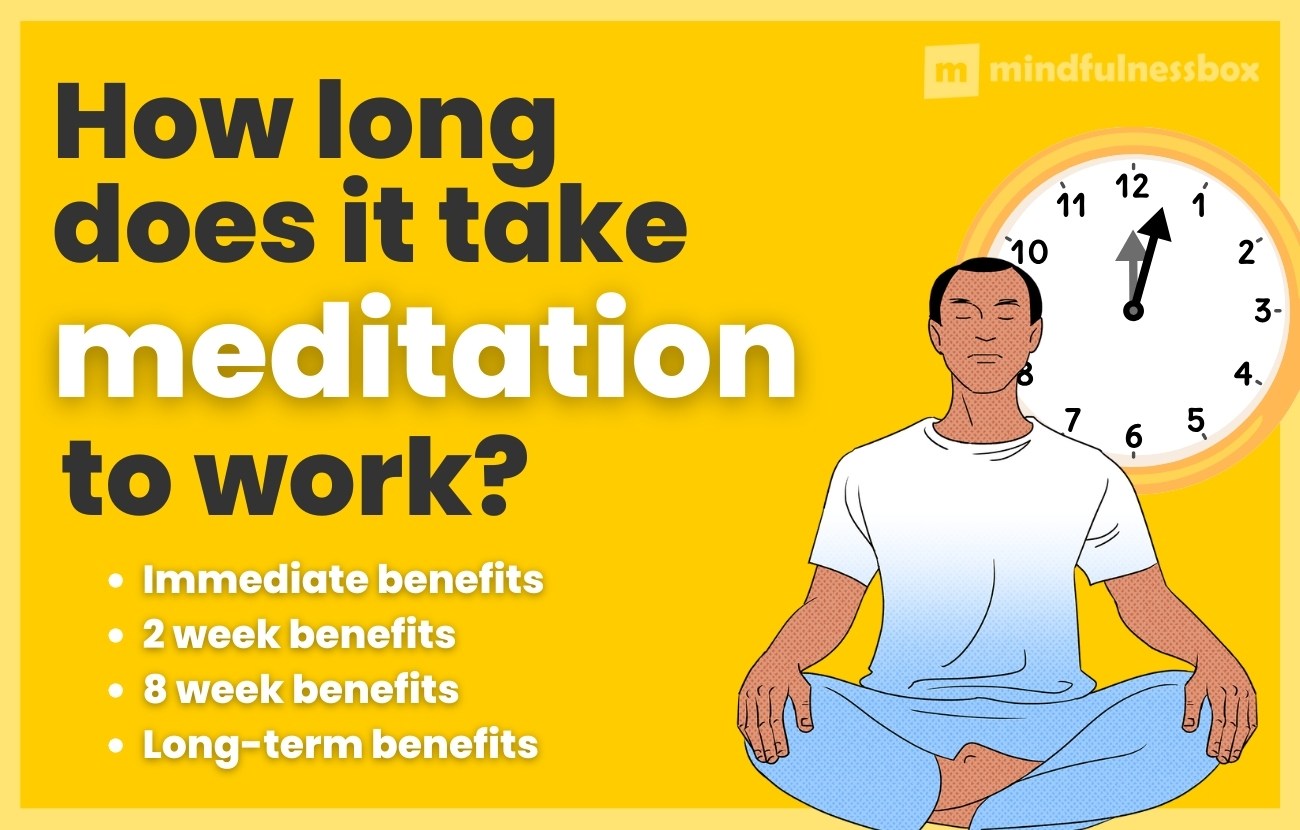The effects of meditation are most commonly seen within eight weeks of daily practice. However, it’s possible for meditation practitioners to notice small changes before that—even as soon as the first meditation session. Remember that the experience differs for everyone.
If you’ve recently started meditation, you might be wondering how long you should meditate, how much time meditation takes to work, and when you should expect to start experiencing changes.
These 100 meditation scripts were created to help beginner and intermediate meditators practice key mindfulness concepts like self-love, forgiveness, gratitude, and inner peace.
Designed to fit into busy schedules, each meditation script lasts 3-5 minutes. Perfect for starting or closing a group meditation; for yoga, coaching, or therapy sessions; or for your personal meditation practice.
Remember to keep your expectations in check—it could be some time before you notice changes in yourself brought on by meditation.
However, based on the research that’s out there, it’s possible to set a few expectations based on the time investment you put into meditation.
How long does it take for meditation to work?
If you’re wondering how many hours or days of meditation you need to see results, there’s extensive research suggesting that significant benefits from meditation can be achieved within eight weeks.
However, many benefits have been shown to accrue sooner.
The below meditation benefits timeline covers six timeframes: from immediate effects, to effects after three decades.
Each time frame references a scientific study to back up the benefits.

Immediate effects of meditation
After your first meditation session, you may experience initial feelings of peace and calm brought on by dedicating time to sit and be still.
One meditation session isn’t quite enough to change your brain, but in addition to feelings of calm, you may experience improved focus and attentional skills.
A pair of 2018 studies looked into whether brief meditation sessions of 10 minutes could provide benefits to inexperienced meditators. They found that even this short amount of meditation improved performance, attention, and focus on the tasks in the experiment.
If you’re wondering how long meditation takes to change your brain, it can happen in as little as 1.5 hours of training.
Benefits after 4 days of meditation
After four days, you may be experiencing improvements in mood and focus as well as lower stress.
A 2010 study found significant improvement in cognitive skills among people who had undergone four days of meditation training for 20 minutes a day.
Compared to the control group, those who underwent meditation training did better on cognitive tests and showed improvements in focus, mood, and stress management.
The lead researcher of this study, Fadel Zeidan, said: “Simply stated, the profound improvements that we found after just 4 days of meditation training are really surprising. It goes to show that the mind is, in fact, easily changeable and highly influenced, especially by meditation.”
Benefits after 2 weeks of meditation
Two weeks of meditation is enough to change your brain’s activity noticeably, improve cognitive performance on standardized tests, improve memory, and decrease mind wandering.
A 2013 study found that two weeks of mindfulness training improved GRE reading-comprehension scores and resulted in less distraction.
There are even more measurable changes happening in the brain by the two week mark.
As a part of the documentary “A Joyful Mind,” researchers looked at experienced meditators as well as research involving novice meditators.
“We can see that a person who meditates for even just two weeks, 30 minutes a day, shows a different pattern of brain activity than when they started two weeks before.
And that is really important because it suggests that the brain really is plastic, that we really can make these changes, and that it actually doesn’t take that much. A total of 7 hours of practice was sufficient to change the brain in very objective, measurable ways.”
Dr. Richard Davidson, PhD, University of Wisconsin
Benefits after 8 weeks of meditation
After eight weeks of daily meditation, you’ll likely experience improved self-awareness, compassion, enhanced focus, lower stress, and lower anxiety.
In 2011, Harvard researchers scanned the brains of meditators participating in an 8-week meditation program. Participants averaged 27 minutes a day of meditation. Researchers found increased gray-matter density in the hippocampus after 8 weeks. This is associated with improved learning, memory, self-awareness, compassion, and introspection.
The same study also found decreased gray-matter density in the amygdala. This is associated with a reduction in anxiety and stress.
Benefits after 2-6 months of meditation
After two to six months of meditation, research has shown improvements in anxiety and depression systems that are comparable with the improvements shown by antidepressant drugs.
A 2014 review of research on the subject looked at 47 trials related to mindfulness meditation and found a moderate improvement in anxiety, depression, and stress symptoms across studies.
According to the study: “These small effects are comparable with what would be expected from the use of an antidepressant in a primary care population but without the associated toxicities.”
Long-term benefits of meditation

After years of meditation and thousands of hours of practice, your brain has the capacity to transform in many ways.
First, your brain is less likely to experience cognitive decline as you age. In long-term meditators, there is less age-related reduction in gray matter in the brain, according to a 2015 UCLA study.
Second, you’re likely to become happier due to less rumination and worry. A 2011 study showed decreased activity in the default mode network (DMN) among experienced meditators. The DMN is responsible for the activity commonly known as “monkey mind,” or the brain’s habit to wander endlessly and get lost in thought. Less activity in the DMN is associated with less rumination, less worry, and greater happiness.
Third, a lifetime of meditation can produce astounding effects. Matthieu Ricard, a Tibetan monk with 30 years of meditation experience, collaborated with researchers at the University of Wisconsin. Researchers measured his brain with 256 sensors during meditation and observed gamma waves greater than any that have been recorded before. His brain’s left prefrontal cortex was also excessively large, indicating an unusual capacity for happiness.
How long should I meditate to see results?
Eight weeks is the standard recommendation for how long you should commit to meditation in order to see results. Many studies have found improvements in meditators after this length of time.
However, you may find that you feel calm and centered even after a single meditation session.
After a few days, your focus and attention should begin to improve. And after as little as a couple of weeks, your brain will be measurably different.
Even though your brain is changing, you may not feel the results right away. Meditation is a lifelong journey, and it’s best to keep expectations in check, since it can take time to see results.
But the studies done on lifetime meditators are clear: adding meditation to your life can make you happier, less negative, and less stressed. Dozens of studies over decades have shown it changes your brain for the better.
Frequently asked questions
When does meditation start working?
The effects of meditation often create an immediate sense of calm following your meditation session, which dissipates as you get further from the session.
Once you’ve built up months or years of meditation practice, there are physical changes that happen in your brain that don’t reverse immediately, even if you stop meditating. However, meditation is a practice. Meditation is just like exercise: when you stop regular practice, your skills atrophy and you start to get out of shape.
How long should you meditate to see results?
Studies on new meditators have observed measurable changes in the brain over the course of two weeks of practice. After eight weeks of practice, gray matter in the hippocampus increases, indicative of improved memory, focus, compassion. And gray matter in the amygdala decreases, indicative of less stress and worry.
Among long-term meditators, the brain’s default mode network activity lessons, leading to a significant decrease in rumination (also known as “monkey mind”). The brain’s prefrontal cortex can also grow dramatically, indicative of an enhanced capability for happiness.
How many hours of meditation do you need to practice to see results?
Even brief sessions of meditation have been shown to improve focus. 20 minutes per day of meditation training for four days was shown to improve focus and cognitive performance on standardized tests, in a 2010 study.

My mindfulness practice kicked off in 2016 with a ten-day silent retreat. Since then, I’ve read dozens of books about mindfulness and completed hundreds of hours of meditation. Thinking about what makes humans happy, calm, and peaceful is endlessly fascinating to me.


